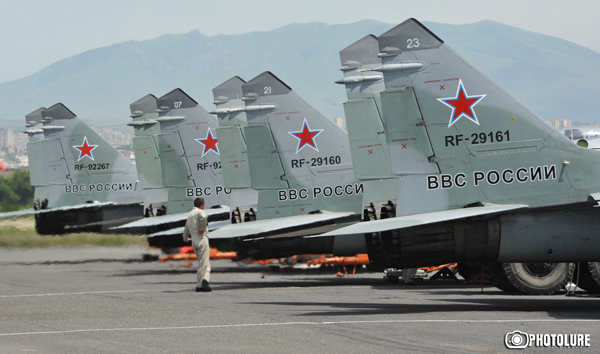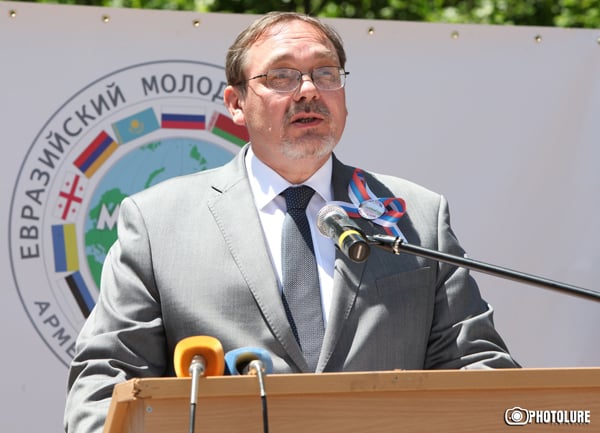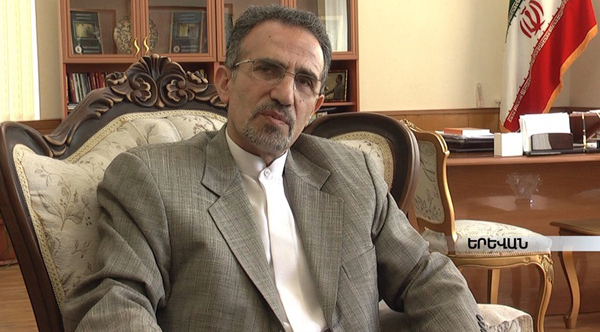Will Russian-Iranian interests coincide in the South Caucasus?
There is no provocative action in the Nagorno-Karabakh conflict by Russia, yesterday Russian Ambassador to Armenia, Ivan Volinkin, stated in the interview with journalists, in response to the questions of the “ArmInfo” journalist about the charges brought up against Russia on complicity in the increased tension in the border. “Russia is absolutely nothing to do here. It stands for peaceful settlement of the Nagorno-Karabakh conflict, and there is no provocative action by Russia,” stressed the diplomat. Volinkin added that the Karabakh conflict should be resolved exclusively by peaceful means. “What is happening now, I not say that it is something extraordinary.
There were subversive actions and skirmishes, which still are going on for many years. But, once again I repeat that I and my country stand for peaceful means of settlement.” Finally, the Russian ambassador to Armenia spoke about the tension in the contact line. But it turns out that in his opinion, nothing extraordinary happens, just subversive actions and skirmishes. But Armenian villages were also bombed, aren’t they? Isn’t this an adequate reason to admit a condemning statement by Armenia’s strategic ally country, or even be somehow referred to at the level of CSTO? Generally, it is noteworthy that the Russian ambassador to Armenia is finding excuses that “there is no provocative action by Russia.” Probably, the recent discontents voiced in Armenia with regard to Russia’s stance, finally, become a cause of anxiety. Of course, it would be good if the Ambassador touches on another disturbing topic to our society, particularly, the issue of why his country is selling weapons to opponent Azerbaijan worth of four billion dollars, of which one and half, is attacking weapon. The point that Russia “exclusively stands for peaceful means of settlement” on Karabakh conflict, is a positive fact, but when Ilham Aliyev’s letter was read at the European Union summit, and Armenia’s possible accession to the EEU was associated with the Nagorno-Karabakh conflict, there was no hint from the president of Russia to avoid making this issue a topic at the Eurasian troika summit. Apparently, Ivan Volinkin, considering the subversive acts and skirmishes non-extraordinary and usual, has made another hint. The rumors popping up from time to time about deployment of Russian peacekeepers in the conflict zone that only in that case the change in the status quo would be acceptable for Russia, perhaps, are not so exaggerated. On the one hand, the current Russian authorities are embedded into the Ukrainian crisis, on the other hand, keeping the possibilities of outbreak of conflicts heated and preserving the influence in the post-Soviet area are preferred options for Moscow. Recently, the journalists met with Ambassador Extraordinary and Plenipotentiary of the Islamic Republic of Iran to Armenia, Mohammad Reisi in the National Press Club. He referred to issue of deployment of Russian peacekeeping forces on the Karabakh-Azerbaijani contact line. “Armenia, Azerbaijan and the OSCE Minsk Group are to decide on the issue. The MG is working and will achieve results. The Minsk Group is working towards a peaceful solution,” mentioned the ambassador, adding that the possibility of resuming hostilities is very low. “The Minsk Group is not willing to resolve the issue military actions, whereas Armenia and Azerbaijan have given the mandate for the settlement of the issue to the MG. The Islamic Republic of Iran is against the deployment of external forces in the region. “I assure you that it would pose a hazard to the entire region. We have been the eye-witness of that in Iraq and Afghanistan. In my opinion, we should not allow the foreign countries to come, intervene and interfere in this issue,” said the ambassador of Iran to Armenia. Answering the question about the recent tension on Karabakh-Azerbaijani and Armenian-Azerbaijani borders, the ambassador said that his country is against violence and extremism. They are in favor of peaceful solution through a dialogue. “We believe that any disagreement must find a peaceful solution. And, if there are peaceful negotiations, why then resort to weapons? We do not want any instability in the region.” The ambassador also reminded that Iran has repeatedly stated that it is ready to contribute to the problem’s solution in case of such a desire by the parties, responding the question of what role Iran can take on Karabakh issue. Iran’s interest in the Karabakh settlement process has always been present, still in heated years of Karabakh war, Iran has tried to reconcile the parties, and after the armistice, it regularly acts as an advocate for establishment of stability in our region, and suggests its support to the Nagorno-Karabakh conflicting parties. However, Iran has always been reminded that the OSCE Minsk Group is dealing with the issue. And Iran has clearly stated that it is against the deployment of peacekeepers. Now, perhaps, Iranian ambassador’s reminder again about inappropriateness of “deployment of foreign forces” is not a coincidence. Another interesting fact, too. Iranian Ambassador to Armenia, Mohammad Reisi, issued an interesting information. Armenia’s government is thinking of transiting Iranian gas to the third countries through the territory of our country. To the question of how the Ambassador would explain the fact that the diameter of Iran-Armenia gas pipeline segment is greater than that of the Armenian sector, Mohammad Reisi responded, “You know, maybe at that time, the funds were not sufficient to build a large diameter pipeline. Frankly speaking, I do not know why. You should refer this question to the government of Armenia. Maybe, at that time, they did not have any intention to transit gas to the Black Sea, Europe, etc. through the territory of Armenia, and now, when there is a demand, perhaps, they just started thinking about it.”
Read also
Back in May, Iranian Deputy Oil Minister, Ali Majedi, said that Tehran is ready to export gas to Europe through the territory of Armenia, detailing that there are three directions of exporting Iranian gas to Europe: through Turkey, through Armenia, Georgia and the Black Sea, and finally, through Iraq, Syria and Lebanese territory. Telling this news by the ambassador of Iran in the context of the developments in Ukraine is a remarkable fact, since he had touched on the topic of making Armenia a transit way for energy-barriers to Europe, and has stressed that relevant infrastructure are required for transition of energy-barriers through the territory of Armenia. “We are in good relations with Russians. We are two countries that can be good partners in energy, especially natural gas industry,” said the ambassador. To the observation whether there is no such a desire and initiative from official Yerevan, the ambassador responded that if respective diameter pipeline is set up, there is no problem with transiting gas through Armenia. Armenia may become a transit country for transporting Iranian gas to western countries, stated, in fact, the ambassador of Iran to Armenia, by presenting a new suggestion. But whether Russia would stand for it. That is the question. On the other hand, the Ambassador’s concern is that there are also centers of tensions in the South Caucasus. Thus, it gives the impression that the Russian-Iranian interests in the South Caucasus, at least at this point, do not coincide.
EMMA GABRIELYAN




















































